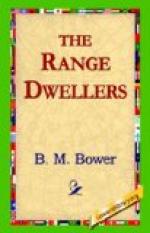Well! maybe you think Frosty and I stood there congratulating the old fox. Frosty wanted me to kick him, I remember; and he said a lot of things that sounded inspired to me, they hit my feelings off so straight. If we had had the sense to do what old King was doing, we’d have been ten or fifteen miles nearer home than we were.
But, anyway, we were up the bank ahead of him, and we loaded in the last package and drove away from the painful scene at a lope. And you can imagine how we didn’t love old King any better, after that experience.
CHAPTER XII.
I Begin to Realize.
If I had hoped that I’d gotten over any foolishness by spending the fall and winter away from White Divide—or the sight of it—I commenced right away to find out my mistake. No sooner did the big ridge rise up from the green horizon, than every scar, and wrinkle, and abrupt little peak fairly shouted things about Beryl King.
She wasn’t there; she was back in New York, and that blasted Terence Weaver was back there, too, making all kinds of love to her according to the letters of Edith. But I hadn’t realized just how seriously I was taking it, till I got within sight of the ridge that had sheltered her abiding-place and had made all the trouble.
Like a fool I had kept telling myself that I was fair sick for the range; for range-horses and range-living; for the wind that always blows over the prairies, and for the cattle that feed on the hills and troop down the long coulee bottoms to drink at their favorite watering-places. I thought it was the boys I wanted to see, and to gallop out with them in the soft sunrise, and lie down with them under a tent roof at night; that I wanted to eat my meals sitting cross-legged in the grass, with my plate piled with all the courses at once and my cup of coffee balanced precariously somewhere within reach.
That’s what I thought. When things tasted flat in old Frisco, I wasn’t dead sure why, and maybe I didn’t want to be sure why. When I couldn’t get hold of anything that had the old tang, I laid it all to a hankering after round-up.
Even when we drove around the end of White Divide, and got up on a ridge where I could see the long arm that stretched out from the east side of King’s Highway, I wouldn’t own up to myself that there was the cause of all my bad feelings. I think Frosty knew, all along; for when I had sat with my face turned to the divide, and had let my cigarette go cold while I thought and thought, and remembered, he didn’t say a word. But when memory came down to that last ride through the pass, and to Shylock shot down by the corral, at last to Frosty standing, tall and dark, against the first yellow streak of sunrise, while I rode on and left him afoot beside a half-dead horse, I turned my eyes and looked at his thin, thoughtful face beside me.
His eyes met mine for half a minute, and he had a little twitching at the corners of his mouth. “Chirk up,” he said quietly. “The chances are she’ll come back this summer.”




